- Home
- Alice Munro
Lives of Girls and Women
Lives of Girls and Women Read online
PENGUIN CELEBRATIONS
LIVES OF GIRLS AND WOMEN
ALICE MUNRO grew up in Wingham, Ontario, and attended the University of Western Ontario. She has published twelve books—Dance of the Happy Shades; Lives of Girls and Women; Something I’ve Been Meaning to Tell You; Who Do You Think You Are?; The Moons of Jupiter; The Progress of Love; Friend of My Youth; Open Secrets; The Love of a Good Woman; Hateship, Friendship, Courtship, Loveship, Marriage; Runaway; and The View from Castle Rock—as well as Selected Stories, an anthology of stories culled from her dazzling body of work.
During her distinguished career, Munro has been the recipient of many awards and prizes, including the W.H. Smith Award in the United Kingdom and, in the United States, the National Book Critics Circle Award, the PEN/Malamud Award for Excellence in Short Fiction, the Lannan Literary Award, and the Rea Award for the Short Story. In Canada, her prize-winning record is so extraordinary—three Governor General’s Awards, two Giller Prizes (one of which was for Runaway), the Trillium Book Award, the Jubilee Prize, and the Libris Award, among many others— that it has been playfully suggested that as such a perennial winner, she no longer qualifies for new prizes. Abroad, acclaim continues to pour in. Both Runaway and Hateship, Friendship, Courtship, Loveship, Marriage won the Commonwealth Writers’ Prize Best Book Award (Caribbean and Canada region), and were chosen as Books of the Year by The New York Times.
Alice Munro’s stories appear regularly in The New Yorker, as well as in The Atlantic, Saturday Night, and The Paris Review. She and her husband divide their time between Clinton (in “Alice Munro country”), Ontario, and Comox, British Columbia.
Lives of Girls and Women
ALICE MUNRO
Published by the Penguin Group
Penguin Group (Canada), 90 Eglinton Avenue East, Suite 700, Toronto, Ontario, Canada M4P 2Y3 (a division of Pearson Canada Inc.)
Penguin Group (USA) Inc., 375 Hudson Street, New York, New York 10014, U.S.A. Penguin Books Ltd, 80 Strand, London WC2R 0RL, England
Penguin Ireland, 25 St Stephen’s Green, Dublin 2, Ireland (a division of Penguin Books Ltd)
Penguin Group (Australia), 250 Camberwell Road, Camberwell, Victoria 3124, Australia (a division of Pearson Australia Group Pty Ltd)
Penguin Books India Pvt Ltd, 11 Community Centre, Panchsheel Park,
New Delhi – 110 017, India
Penguin Group (NZ), 67 Apollo Drive, Rosedale, North Shore 0745, Auckland, New Zealand (a division of Pearson New Zealand Ltd)
Penguin Books (South Africa) (Pty) Ltd, 24 Sturdee Avenue, Rosebank,
Johannesburg 2196, South Africa
Penguin Books Ltd, Registered Offices: 80 Strand, London WC2R 0RL, England
First published by McGraw-Hill Ryerson Limited, 1971 Published in Penguin Canada paperback by Penguin Group (Canada), a division of Pearson Canada Inc., 1990, 1997, 2005
Published in this edition, 2009
1 2 3 4 5 6 7 8 9 10 (WEB)
Copyright © Alice Munro, 1971
All rights reserved. Without limiting the rights under copyright reserved above,
no part of this publication may be reproduced, stored in or introduced into a retrieval system, or transmitted in any form or by any means (electronic, mechanical, photocopying, recording or otherwise), without the prior written permission of both the copyright owner
and the above publisher of this book.
Publisher’s note: This book is a work of fiction. Names, characters, places and incidents either are the product of the author’s imagination or are used fictitiously, and any resemblance
to actual persons living or dead, events, or locales is entirely coincidental.
Manufactured in Canada.
ISBN: 978-0-14-317153-9
Library and Archives Canada Cataloguing in Publication data available upon request to the publisher.
Except in the United States of America, this book is sold subject to the condition that it shall not, by way of trade or otherwise, be lent, re-sold, hired out, or otherwise circulated without the publisher’s prior consent in any form of binding or cover other than that in which it is published and without a similar condition including this condition being imposed on the subsequent purchaser.
Visit the Penguin Celebrations website at www.penguincelebrations.ca
Special and corporate bulk purchase rates available; please see www.penguin.ca/corporatesales or call 1-800-810-3104, ext. 477 or 474
For Jim
Contents
The Flats Road
Heirs of the Living Body
Princess Ida
Age of Faith
Changes and Ceremonies
Lives of Girls and Women
Baptizing
Epilogue: The Photographer
Lives of Girls and Women
The Flats Road
We spent days along the Wawanash River, helping Uncle Benny fish. We caught the frogs for him. We chased them, stalked them, crept up on them, along the muddy riverbank under the willow trees and in marshy hollows full of rattails and sword grass that left the most delicate, at first invisible, cuts on our bare legs. Old frogs knew enough to stay out of our way, but we did not want them; it was the slim young green ones, the juicy adolescents, that we were after, cool and slimy; we squished them tenderly in our hands, then plopped them in a honey pail and put the lid on. There they stayed until Uncle Benny was ready to put them on the hook.
He was not our uncle, or anybody’s.
He stood a little way out in the shallow brown water, where the muddy bottom gives way to pebbles and sand. He wore the same clothes every day of his life, everywhere you saw him—rubber boots, overalls, no shirt, a suit jacket, rusty black and buttoned, showing a V of tough red skin with a tender edge of white. A felt hat on his head had kept its narrow ribbon and two little feathers, which were entirely darkened with sweat.
Though he never turned around he knew if we put a foot in the water.
“You kids want to splash in the mud and scare off the fish you go and do it someplace else, get off of my riverbank.”
It was not his. Right here, where he usually fished, it was ours. But we never thought of that. To his way of thinking the river and the bush and the whole of Grenoch Swamp more or less belonged to him, because he knew them, better than anybody else did. He claimed he was the only person who had been right through the swamp, not just made little trips in around the edges. He said there was a quicksand hole in there that would take down a two-ton truck like a bite of breakfast. (In my mind I saw it shining, with a dry-liquid roll—I had it mixed up with quicksilver.) He said there were holes in the Wawanash River that were twenty feet deep in the middle of summer. He said he could take us to them, but he never did.
He was prepared to take offense at a glimmer of doubt.
“You fall into one of them, then you’ll believe me.”
He had a heavy black moustache, fierce eyes, a delicate predatory face. He was not so old as his clothes, his moustache, his habits, would lead you to believe, he was the sort of man who becomes a steadfast eccentric almost before he is out of his teens. In all his statements, predictions, judgements there was a concentrated passion. In our yard, once, looking up at a rainbow, he cried, “You know what that is? That’s the Lord’s promise that there isn’t ever going to be another flood!” He quivered with the momentousness of this promise as if it had just been made, and he himself was the bearer of it.
When he had caught what fish he wanted (he threw back the black bass, kept the chub and redfin, saying that redfin was a tasty fish, though full of bones as a pincushion is of needles), we would all climb out of the shady river-trough and head across the fields toward his house. Owen and I, barefoot, walked
easily on stubble. Sometimes our unsociable dog, Major, followed at a distance. Away at the edge of the bush—the bush that turned into the swamp, a mile further in—was Uncle Benny’s house, tall and silvery, old unpainted boards, bleached dry in the summer, and dark green blinds, cracked and torn, pulled down over all the windows. The bush behind it was black, hot, thick with thorny bushes and dense with insects whirling in galaxies.
Between the house and the bush were several pens in which he had always some captive animals—a half-tame golden ferret, a couple of wild mink, a red fox whose leg had been torn in a trap. She limped, and howled at night, and was called Duchess. The coons he did not need pens for. They lived around the yard and in the trees, tamer than cats, and came to the door to be fed. They were fond of chewing gum. Squirrels came too and sat boldly on the window sills and foraged in the piles of newspapers on the porch.
There was also a shallow sort of pen, or excavation, in the dirt beside the wall of the house, with boards nailed up around it on the other three sides, to the height of about two feet. This was where Uncle Benny had kept the turtles. One summer he had abandoned everything to catch turtles. He said he was going to sell them to an American from Detroit, who would pay him thirty-five cents a pound.
“Make them into soup,” said Uncle Benny, hanging over his turtle pen. Much as he enjoyed taming and feeding animals, he enjoyed also their unpleasant destinies.
“Turtle soup!”
“For Americans,” said Uncle Benny, as if that explained it. “I wouldn’ touch it myself”
Either the American did not show up, or he would not pay what Uncle Benny wanted, or he had been no more than a rumour in the first place; the scheme came to nothing. A few weeks later Uncle Benny would look blank if you mentioned turtles; he would say, “Aw, I’m not botherin’ my head about that business no more,” as if he felt sorry for you, for being so far behind the times.
Sitting in his favourite chair just inside our kitchen door—he would sit there as if he hardly had time to sit down, did not want to trouble anybody, would be off in a minute—Uncle Benny was always full of news about some business venture, always an extraordinary one, by which people not very far away, down in the south of the county or as near by as Grantly Township, were making preposterous sums of money. They raised chinchilla rabbits. They bred budgie birds. They made ten thousand dollars a year and barely had to work for it. Probably the reason he kept on working for my father, though he had never worked steadily at any other job, was that my father raised silver foxes, and there was in such a business something precarious and unusual, some glamorous and ghostly, never realized, hope of fortune.
He cleaned the fish on his porch and, if he felt like eating, fried some immediately in a pan which kept its ancient, smoky grease. He ate from the pan. No matter how hot and bright it was outside he had a light on, one single bulb hanging from the ceiling. The deep, deep, layered clutter and dirt of the place swallowed light.
Owen and I, going home, would sometimes try to name off the things he had in his house, or just in his kitchen.
“Two toasters, one with doors one you lay the toast on.”
“Seat out of a car.”
“Rolled-up mattress. An accordion.”
But we weren’t getting half, we knew it. The things we remembered could have been taken out of the house and never missed; they were just a few things revealed and identifiable on top of such a wealth of wreckage, a whole rich dark rotting mess of carpets, linoleum, parts of furniture, insides of machinery, nails, wire, tools, utensils. This was the house Uncle Benny’s parents had lived in, all their married life. (I could just remember them, old and heavy and half-blind, sitting on the porch in the sunlight, wearing many dark layers of disintegrating clothes.) So part of the accumulation was that of fifty years or so of family life. But it was also made up of other people’s throwaways, things Uncle Benny would ask for and bring home, or even lug from the Jubilee dump. He hoped to patch things up and make them usable and sell them, he said. If he had lived in a city he would have run an enormous junk shop; he would have spent his life among heaps of soiled furniture and worn-out appliances and chipped dishes and grimy pictures of other people’s relatives. He valued debris for its own sake and only pretended, to himself as well as to others, that he meant to get some practical use out of it.
But what I liked best around his place, and would never tire of, were the newspapers piled on the porch. He did not take either the Jubilee Herald-Advance or the city newspaper which arrived in our mailbox a day late. He did not subscribe to the Family Herald or the Saturday Evening Post. His paper came once a week and was printed badly on rough paper, with headlines three inches high. It was his only source of information about the outside world, since he seldom had a radio that was working. This was a world unlike the one my parents read about in the paper, or heard about on the daily news. The headlines had nothing to do with the war, which had started by that time, or elections, or heat waves, or accidents, but were as follows:
FATHER FEEDS TWIN DAUGHTERS TO HOGS
WOMAN GIVES BIRTH TO HUMAN MONKEY
VIRGIN RAPED ON CROSS BY CRAZED MONKS
SENDS HUSBAND’S TORSO BY MAIL
I would sit and read on the edge of the sagging porch, my feet brushing Sweet William that Uncle Benny’s mother must have planted. Finally Uncle Benny would say, “You’re welcome to take those papers home if you want to. I’m all done reading them.”
I knew better than to do that. I read faster and faster, all I could hold, then reeled out into the sun, onto the path that led to our place, across the fields. I was bloated and giddy with revelations of evil, of its versatility and grand invention and horrific playfulness. But the nearer I got to our house the more this vision faded. Why was it that the plain back wall of home, the pale chipped brick, the cement platform outside the kitchen door, washtubs hanging on nails, the pump, the lilac bush with brown-spotted leaves, should make it seem doubtful that a woman would really send her husband’s torso, wrapped in Christmas paper, by mail to his girl friend in South Carolina?
Our house was at the end of the Flats Road, which ran west from Buckles’ Store, at the edge of town. This rickety wooden store, so narrow from front to back it looked like a cardboard box stood on end, haphazardly plastered with metal and painted signs advertising flour, tea, rolled oats, soft drinks, cigarettes, was always to me the sign that town had ended. Sidewalks, street lights, lined-up shade trees, milkmen’s and icemen’s carts, birdbaths, flower-borders, verandahs with wicker chairs, from which ladies watched the street—all these civilized, desirable things had come to an end, and we walked— Owen and I coming from school, my mother and I coming from shopping on a Saturday afternoon—on the wide meandering Flats Road, with no shade from Buckles’ Store to our house, between fields ragged with weeds, and yellow with dandelions, wild mustard, or goldenrod, depending on the season of the year. Houses here were set further apart and looked in general more neglected, poor and eccentric than town houses would ever be; half a wall would be painted and the job abandoned, the ladder left up; scars of a porch torn away were left uncovered, and a front door without steps, three feet off the ground; windows could be spread with yellowed newspapers in place of blinds.
The Flats Road was not part of town but it was not part of the country either. The curve of the river, and the Grenoch Swamp, cut it off from the rest of the township, to which it nominally belonged. There were no real farms. There were Uncle Benny’s and Potters’ places, fifteen and twenty acres, Uncle Benny’s going back to bush. The Potter boys raised sheep. We had nine acres and raised foxes. Most people had one or two acres and a bit of livestock, usually a cow and chickens and sometimes something more bizarre that would not be found on an ordinary farm. The Potter boys owned a family of goats, which they turned loose to graze along the road. Sandy Stevenson, a bachelor, kept a little grey donkey, like the illustration to a Bible story, pasturing in the stony corner of a field. My father’s enterprise was not
out of the way here.
Mitch Plim and the Potter boys were the bootleggers on the Flats Road. Their styles were different. The Potter boys were cheerful, though violent-tempered when drunk. They gave Owen and me a ride home from school in their pickup truck; we were in the back, flung from side to side because they drove so fast and hit so many bumps; my mother had to take a deep breath when she heard about it. Mitch Plim lived in the house that had newspapers over the windows; he did not drink himself, was crippled up with rheumatism and spoke to nobody; his wife came wandering out to the mailbox, any hour of the day, in a tattered flounced housecoat, barefoot. Their whole house seemed to embody so much that was evil and mysterious that I would never look at it directly, and walked by with my face set stiffly ahead, controlling my urge to run.
There were also two idiots on the road. One was Frankie Hall; he lived with his brother Louie Hall who operated a watch and clock repair business out of an unpainted, false-fronted store building beside Buckles’ Store. He was fat and pale like something carved out of Ivory soap. He sat out in the sun, beside the dirty store window cats slept in. The other one was Irene Pollox, and she was not so gentle or so idiotic as Frank; she would chase children on the road and hang over her gate crowing and flapping like a drunken rooster. So her house too was a dangerous one to pass, and there was a rhyme to say, that everybody knew:
Irene don’t come after me
Or I’ll hang you by your tits in a crab-apple tree.
I said it when I went past with my mother, but knew enough to change tits to heels. Where had that rhyme come from? Even Uncle Benny said it. Irene was white-haired, not from age but because she was born that way, and her skin also was white as goosefeathers.
The Flats Road was the last place my mother wanted to live. As soon as her feet touched the town sidewalk and she raised her head, grateful for town shade after Flats Road sun, a sense of relief, a new sense of consequence flowed from her. She would send me to Buckles’ Store when she ran out of something, but she did her real shopping in town. Charlie Buckle might be slicing meat in his back room when we went by; we could see him through the dark screen like a figure partly hidden in a mosaic, and bowed our heads and walked quickly and hoped he did not see us.

 Runaway
Runaway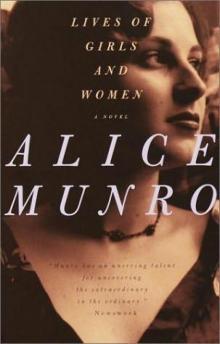 Lives of Girls and Women
Lives of Girls and Women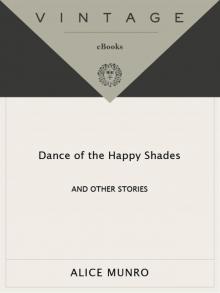 Dance of the Happy Shades
Dance of the Happy Shades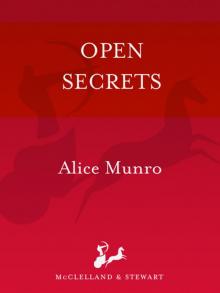 Open Secrets
Open Secrets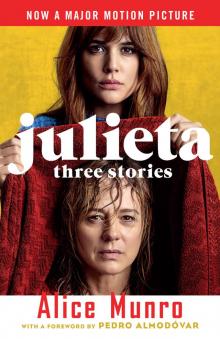 Julieta (Movie Tie-in Edition)
Julieta (Movie Tie-in Edition)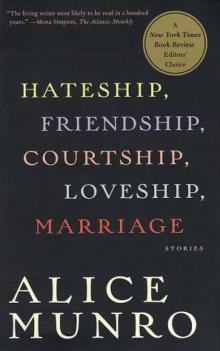 Hateship, Friendship, Courtship, Loveship, Marriage: Stories
Hateship, Friendship, Courtship, Loveship, Marriage: Stories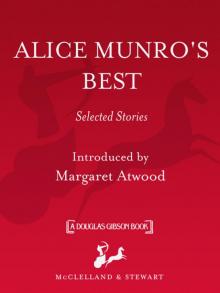 Alice Munro's Best
Alice Munro's Best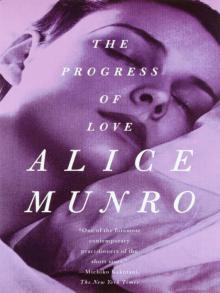 The Progress of Love
The Progress of Love Selected Stories
Selected Stories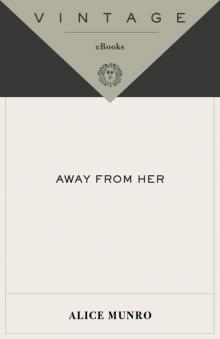 Away from Her
Away from Her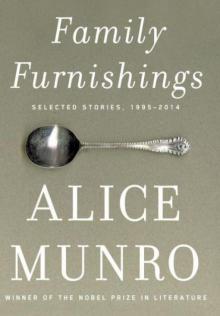 Family Furnishings
Family Furnishings Moons of Jupiter
Moons of Jupiter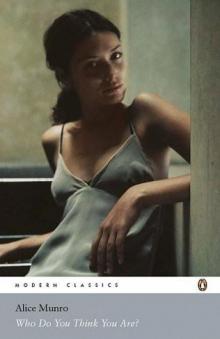 Who Do You Think You Are?
Who Do You Think You Are?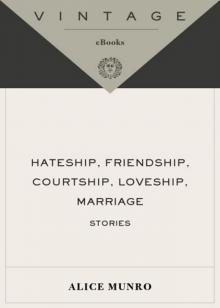 Hateship, Friendship, Courtship, Loveship, Marriage
Hateship, Friendship, Courtship, Loveship, Marriage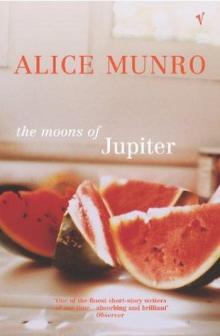 The Moons of Jupiter
The Moons of Jupiter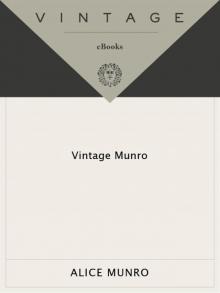 Vintage Munro
Vintage Munro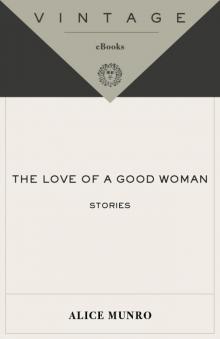 The Love of a Good Woman
The Love of a Good Woman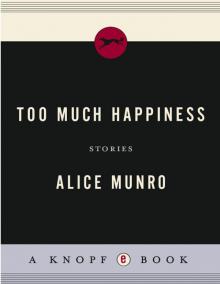 Too Much Happiness
Too Much Happiness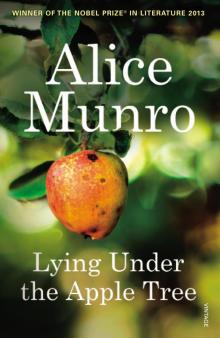 Lying Under the Apple Tree
Lying Under the Apple Tree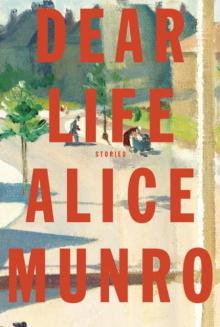 Dear Life
Dear Life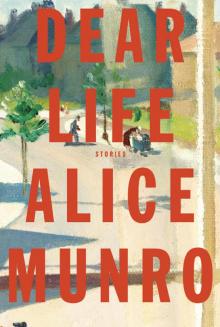 Dear Life: Stories
Dear Life: Stories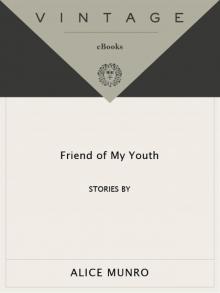 Friend of My Youth
Friend of My Youth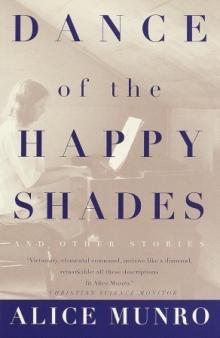 Dance of the Happy Shades: And Other Stories
Dance of the Happy Shades: And Other Stories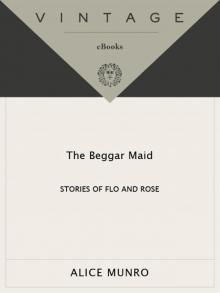 The Beggar Maid
The Beggar Maid